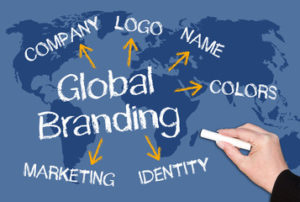By, Natalie Filice, Katie Kirk, & McKenna McVicker
In past decades, success in entering international markets was dominated by a few brand-giants. Major market leaders such as Coca Cola and IMB developed sustainable global brand strategies that enabled their success within markets worldwide. Today, expanding into segments abroad is not limited to just big-name market dominators. Consumer access to products and information has increased exponentially. The ability to easily spread brand awareness through the internet and social media has lessened some barriers to international market entry.
The article posted on K-International.com, 5 Examples of Powerful Global Branding in Action, by Jonny Henchman, outlines companies that have developed a successful global brand strategy, and arguably some of the most powerful strategies within their industries. Creating a brand strategy that transcends borders requires providing consumers with a consistent image and producing a product or service that is demanded across all markets. Another crucial element is having a strong grasp on the demands, purchasing practices, and cultural traditions of local segments. These companies combining these tactics creating a “glocal” strategy that had lead to their international success and brand strength.
AirBnB
This internationally renowned market disruptor that has forever changed the travel and recreation industry. Chief Marketing Officer developed AirBnB’s global strategy that has enabled the company to extend its brand into over 190 countries.Their global strategy boils down to localisation. They have specific departments that are responsible for capturing each locations unique identity and communicating that identity across the world. AirBnB has been a global success because of authenticity they capture in each destination. This story is then captured and delivered to consumers in a way that upholds the brands image. No matter where a traveler goes, they trust that they will have the best vacation experience when booking with AirBnB. The value that the AirBnB brand provides consumers is unparalleled.
Ikea
Ikea, one of the world’s most recognized brands, owes its global success to the company’s ability to be understand its international customer segments, as well as its ability to bring universal value. Regardless of the market segment or nation, the Ikea brand is characterized by having easily obtainable, quality furnishing that are sustainable, functional, and affordable. Ikea’s extensive research divisions dive deep into the customers and purchasing patterns of segments around the world, monitoring the Ikea brand image as well as societal preference shifts. Ikea’s ability to be universally appealing but capture local preferences has lead to is international dominance.
Apple
Apple is arguably one of the most powerful brands in the world. They have mastered the one-size-fits-all strategy, offering the same product in all of its markets. This tactic, although proving to be historically risky, is what has lead to Apple’s international success. No matter what market segment, Apple provides its consumers, with a consistent product; when a consumer is purchasing an apple product, he or she has the expectation that they are purchasing a cutting-edge, high quality device. Similar to Ikea, Apple takes into consideration the nuances of local market segments.This consistency, along with developing streamlined products, is what has contributed to the international success of the brand.
Starbucks
It can be argued that Starbucks is one of the most recognizable brands world-wide. Starbucks’ global brand power is a direct result of the company ability to deliver consistency among locations. Regardless of where a customer is in the world, Starbucks will feel like a local coffee house and will deliver a consistently satisfying product and experience. The coffee giant were also first movers within the industry to capitalize on developing and implementing a valuable CRM system. Having a personalised reward system via mobile applications has furthered the firm’s brand image.
Coca-Cola
In 2000, Coke launched its “think local, act local” campaign in attempt to better grasp the local markets in which it participated in. Despite the fact that Coke has been an international player for decades, this locally focused marketing initiative pushed the brand to an even stronger position. Coke has mastered embodying universal values – happiness and companionship – and communicating those ideals through a local lense. The market giant created a brand image that is synonymous with happiness and companionship.
Reference:
http://www.k-international.com/blog/5-examples-of-powerful-global-branding-in-action/
